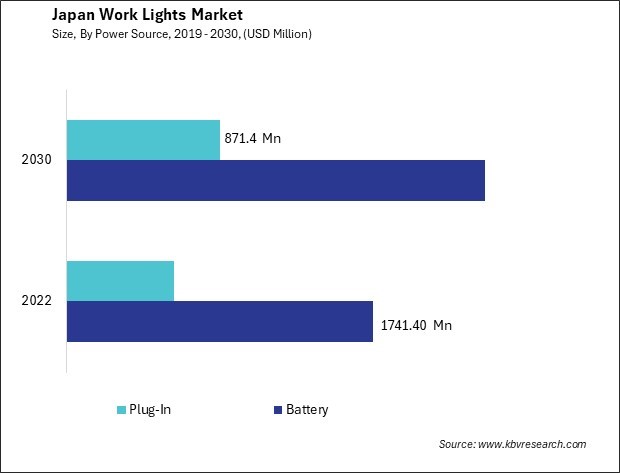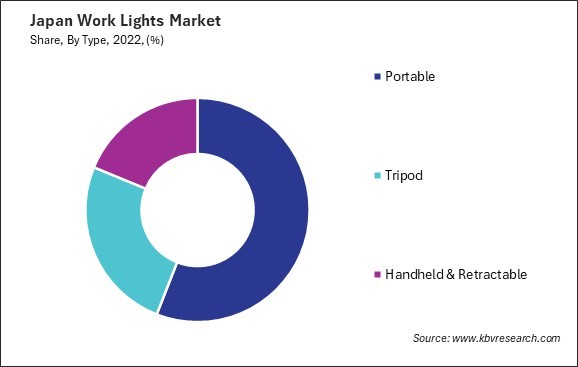Int'l : +1(646) 832-2886 | query@kbvresearch.com
Int'l : +1(646) 832-2886 | query@kbvresearch.com
Published Date : 17-May-2024 |
Pages: 61 |
Formats: PDF |
The Japan Work Lights Market Market size is expected to reach $3.3 Billion by 2030, rising at a market growth of 4.2% CAGR during the forecast period. In the year 2022, the market attained a volume of 40321.1 thousand units, experiencing a growth of 5.0% (2019-2022).
The work lights market in Japan is witnessing significant growth, driven by a combination of factors that reflect the country's unique economic and industrial landscape. The manufacturing industry in Japan, renowned for its precision and efficiency, is a key contributor to the robust work lights market. Factories and workshops require reliable lighting solutions to enhance productivity and ensure the safety of workers.

Furthermore, the trend of remote and flexible work arrangements has increased demand for portable and rechargeable work lights. This shift in work culture, accelerated by global events, has influenced the preferences of Japanese professionals seeking versatile lighting solutions catering to indoor and outdoor workspaces.
E-commerce platforms and specialized retailers are crucial in distributing work lights in Japan by offering a wide range of products to cater to different industries and applications. Additionally, manufacturers are focusing on product innovation and customization to meet the specific requirements of various end-users.
According to the International Trade Administration, in 2021, the e-commerce sector witnessed a notable growth of 8.6% in sales of goods, reaching a total industry valuation of USD 188.1 billion in Japan. This represents a substantial increase of 32.2% compared to the pre-COVID year 2019. Increased e-commerce sales and the growing importance of adaptable lighting solutions underscore the dynamic shifts in consumer behavior and work lights market dynamics within Japan's retail and work-related sectors.
The manufacturing sector in Japan has witnessed a remarkable expansion, significantly impacting the work lights market in the country. One key driver of this expansion is the relentless pursuit of efficiency and productivity in Japanese manufacturing. Manufacturers in Japan recognize the pivotal role that lighting plays in optimizing operational processes and ensuring precision in intricate tasks.
According to the International Trade Administration, Japanese manufacturing firms have demonstrated a strong commitment to advancing their digital infrastructure, with a substantial investment of around $890 million. This dedicated financial commitment is anticipated to significantly surge, reaching an estimated $4.1 billion by 2030. Concurrently, the manufacturing sector has played a pivotal role in Japan's economic landscape, contributing over 20% to the nation's GDP through value-added processes. This strategic focus on manufacturing is particularly noteworthy in the context of the burgeoning work lights market in Japan, signaling a robust expansion within the sector.
The electronics manufacturing industry, another cornerstone of Japan's economic prowess, has similarly fueled the expansion of the work lights market. Given the miniaturized nature of electronic components and the intricacy of assembly processes, specialized lighting solutions that reduce glare, eliminate shadows, and provide uniform illumination have become essential.
Government initiatives, such as the "Connected Industries" strategy aimed at promoting the integration of digital technology into manufacturing processes, have further catalyzed the adoption of advanced lighting solutions in Japan. Smart work lights, capable of integrating with other manufacturing technologies and systems, are becoming integral to realizing Japan's vision for smart manufacturing. Therefore, Japan's thriving manufacturing sector, driven by a commitment to efficiency and productivity, has propelled the work lights market forward.
In recent years, Japan has witnessed a notable surge in the popularity of battery-powered lights within the work lights market, reflecting a growing trend towards efficiency, sustainability, and flexibility. One key factor driving the rising adoption of battery-powered work lights is the emphasis on energy efficiency and eco-friendliness. As Japan prioritizes sustainability, consumers and businesses gravitate toward solutions that minimize environmental impact.
Furthermore, the versatility of battery-powered work lights is particularly appealing to the Japanese workforce. Operating without being tethered to electrical outlets enhances mobility and facilitates work in diverse environments. This is especially valuable in sectors such as construction, where workers often navigate dynamic and challenging job sites. In addition to their functional advantages, battery-powered work lights are gaining popularity due to advancements in battery technology. Renowned for its innovation in electronics, Japan is at the forefront of developing high-performance batteries that offer extended life and faster charging times.
The government's initiatives to promote sustainable practices and reduce reliance on traditional power sources also play a pivotal role in driving the transition towards battery-powered work lights. Incentives and subsidies for businesses adopting energy-efficient technologies incentivize the widespread adoption of these lighting solutions. Hence, Japan's work lights market has experienced a surge in the popularity of battery-powered lights, fueled by a strong emphasis on energy efficiency, environmental sustainability, and advancements in battery technology.

The work lights market in Japan is a dynamic sector characterized by a diverse range of companies catering to various industries. These companies play a crucial role in providing illumination solutions for workplaces, construction sites, and other environments. One prominent company in the Japanese work lights market is Panasonic Corporation. With a strong reputation for technological prowess, Panasonic has established itself as a leading provider of work lights designed to meet the specific needs of Japanese businesses. The company's products are known for their durability and energy efficiency, aligning with the country's sustainability and resource conservation focus.
Another noteworthy participant is Nichia Corporation, a company recognized for its expertise in LED technology. Nichia's work lights incorporate cutting-edge LED advancements, ensuring bright illumination and energy savings. In a country where energy efficiency is a priority, Nichia's products have gained popularity among businesses seeking reliable, eco-friendly lighting solutions.
Daiwa House Industry Co., Ltd. is a significant player in the Japanese work lights market, offering comprehensive workplace solutions, including work lights. As a company specializing in construction and real estate development, Daiwa House Industry understands the unique requirements of the construction sector in Japan. Their work lights are tailored to enhance visibility and safety on construction sites, contributing to the overall efficiency of projects.
In the realm of portable and handheld work lights, Ryobi Limited has made a notable impact. The company's emphasis on user-friendly designs and portability has resonated well with Japanese consumers. Ryobi's work lights are often favored by professionals and DIY enthusiasts for their convenience and reliable performance in various settings.
The Japanese work lights market also features smaller, niche players that cater to specific industries. These companies often focus on customization and addressing niche demands. For instance, companies like Yamada Shomei Co., Ltd. specialize in explosion-proof work lights, ensuring safety in environments where the risk of explosions is a concern, such as chemical and petrochemical industries. As the country continues to prioritize efficiency, safety, and sustainability, these companies are likely to play a pivotal role in shaping the future of the Japanese work lights market.
By Power Source
By Type
By Light Technology
By End-Use